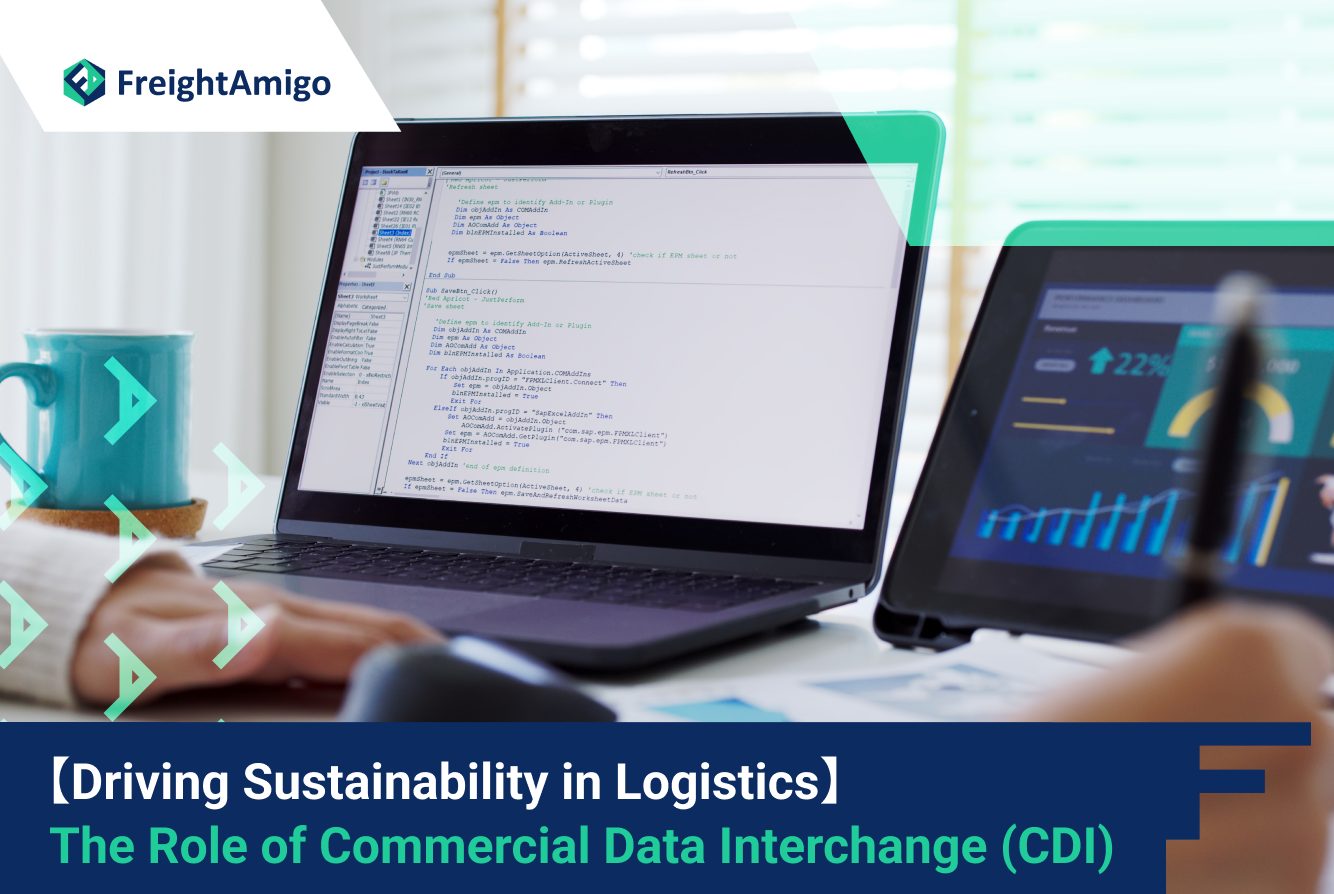Author Name: Tiffany Lee – Marketing Analyst at FreightAmigo
In the age of digital transformation, sustainability has become a significant consideration for businesses across the globe. As companies strive to reduce their environmental impact, the logistics sector is no exception. This article will explore how Commercial Data Interchange (CDI) can contribute to sustainable logistics practices, such as optimizing routes, reducing fuel consumption, and minimizing carbon emissions.
Want To Compare The Best Express, Air Freight, Sea Freight, Rail Freight & Trucking Rates So As To Have Better Control On Cost?
Introduction to Sustainable Logistics
Sustainable logistics refers to the efforts made by companies to minimize their environmental impact while efficiently managing the flow of goods, services, and information between the point of origin and the point of consumption. This concept is not just about ‘going green’. It also involves reducing waste, improving efficiency, and saving costs, thereby contributing to a healthier bottom line.
Many factors contribute to the sustainability of logistics operations. These include the use of environmentally friendly vehicles and materials, efficient route planning, energy management, waste reduction, and more. However, achieving these goals requires the right tools and technologies. One such technology is the Commercial Data Interchange (CDI).
What is Commercial Data Interchange (CDI)?
Commercial Data Interchange (CDI) is a digital technology that allows companies to exchange business information electronically. It facilitates the smooth and efficient transfer of data between different systems, removing the need for paper-based processes and manual data entry. This not only speeds up operations but also reduces the risk of errors.
CDI can handle a variety of data types, including purchase orders, invoices, shipping notices, and more. By automating these processes, businesses can save time, increase accuracy, and improve collaboration with partners. But the benefits of CDI are not limited to operational efficiency. It also has a significant role to play in driving sustainable logistics.
The Link Between CDI and Sustainable Logistics
CDI’s role in sustainable logistics is multifaceted. Firstly, by digitizing and streamlining operations, it reduces the need for physical resources, thereby minimizing waste. Secondly, it aids in efficient route planning, leading to reduced fuel consumption and lower carbon emissions.
CDI’s ability to provide real-time data is also crucial in this context. By giving logistics managers access to up-to-date information, it enables them to make informed decisions that maximize efficiency and minimize environmental impact. In other words, CDI can help businesses achieve their sustainability goals while also improving their operational performance.
Role of CDI in Optimizing Routes for Sustainable Logistics
One of the primary ways in which CDI contributes to sustainable logistics is through route optimization. By providing real-time data on delivery schedules, traffic conditions, and other factors, it enables logistics managers to plan the most efficient routes for their vehicles. This not only reduces travel time and fuel consumption but also minimizes wear and tear on vehicles, thereby prolonging their lifespan.
Furthermore, by enabling real-time tracking of vehicles, CDI allows for dynamic route planning. This means that routes can be adjusted on-the-go based on changing conditions, further enhancing efficiency and sustainability.
How CDI Helps in Reducing Fuel Consumption in Logistics
Fuel consumption is a major concern in logistics, both from a cost and an environmental perspective. CDI can help address this issue by providing data on vehicle performance, fuel efficiency, and other relevant factors. This information can be used to identify inefficiencies and implement corrective measures.
For instance, CDI data can reveal if a vehicle’s fuel consumption is higher than expected for its route and load. This could indicate a maintenance issue, such as a faulty engine or tires. By identifying and addressing these issues, companies can improve fuel efficiency, reduce costs, and lower their environmental impact.
Minimizing Carbon Emissions with the Help of CDI
Minimizing carbon emissions is a key aspect of sustainable logistics. CDI can support this goal in several ways. As already mentioned, it enables efficient route planning and fuel management, both of which can significantly reduce carbon emissions.
In addition, CDI can help companies measure their carbon footprint accurately. By providing data on fuel consumption, vehicle performance, and other factors, it allows businesses to calculate their emissions and track their progress towards sustainability goals.
The Future of CDI in Driving Sustainability in Logistics
The role of CDI in driving sustainability in logistics is likely to grow in the future. As technology continues to evolve, CDI is set to become more sophisticated and powerful, offering even greater benefits for sustainable logistics.
For instance, the integration of CDI with advanced technologies such as Artificial Intelligence (AI) and Machine Learning (ML) could further enhance route optimization and fuel management. Similarly, the combination of CDI with Internet of Things (IoT) technology could enable more accurate tracking of vehicles and cargo, leading to improved efficiency and sustainability.
Conclusion
In conclusion, Commercial Data Interchange (CDI) has a significant role to play in driving sustainable logistics. By enabling efficient route planning, reducing fuel consumption, and minimizing carbon emissions, it can help businesses achieve their sustainability goals while also improving their operational performance. As technology continues to evolve, the role of CDI in sustainable logistics is set to grow, offering exciting possibilities for the future.
There Are Different Options For Cargo Transportation. If You Want To Choose The Most Convenient And Suitable Solution, It Is Best To Have The Full Support Of Logistics Experts! If You Are Planning To Ship Goods Overseas, Please Go To The FreightAmigo Page For Inquiries.
===
Read More:
【Logistics News】Singapore to Sign Declaration on Green Shipping Corridors
FreightAmigo Won Startup Grand Award In TechChallenge — Digitising Trade Finance
Sailing Schedule: Streamlining Logistics Operations for Efficient Shipments
===
If you have any inquiries on logistics/supply chain, feel free to contact FreightAmigo now:
Chat with us online OR
Phone : +852 28121686
WhatsApp: +852 27467829



